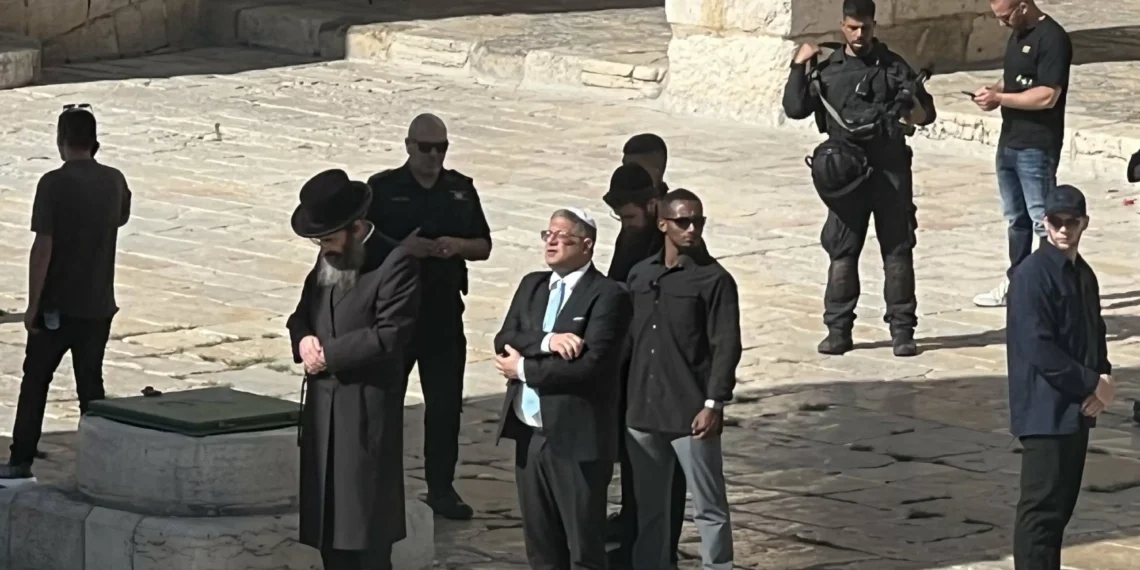Israel’s Far-Right Minister Jeopardizes Gaza Cease-Fire Talks with Provocative Visit to Jerusalem’s Holy Site
The recent fragile cease-fire between Israel and Gaza has been put at risk by the actions of Israel’s far-right national security minister, Itamar Ben-Gvir. On Thursday morning, Ben-Gvir made a highly controversial visit to Jerusalem’s most sensitive holy site, further fueling tensions in the already volatile region.
The holy site in question is the Temple Mount, known to Muslims as the Al-Aqsa Mosque compound and to Jews as the Temple Mount. It is considered one of the most sacred places in the world for both religions and has been a source of conflict for decades.
Ben-Gvir’s visit to the Temple Mount was seen as a direct provocation by Palestinians and the international community. The minister, known for his extremist views and incendiary rhetoric, was accompanied by a group of right-wing activists and was seen waving an Israeli flag, a move that is highly provocative in the eyes of Palestinians.
This visit comes at a critical time when negotiations for a long-term cease-fire between Israel and Gaza are ongoing. The cease-fire, which was brokered by Egypt, has been holding for the past few weeks, bringing much-needed relief to the people of Gaza who have been suffering from years of conflict and blockade.
However, Ben-Gvir’s actions have put this progress at risk. His visit to the holy site has been condemned by Palestinian leaders, who have accused him of trying to change the status quo and ignite further violence. The visit has also been criticized by the international community, with the United Nations expressing concern and calling for restraint from all parties.
The timing of Ben-Gvir’s visit is particularly concerning as it coincides with the Jewish holiday of Tisha B’Av, which commemorates the destruction of the First and Second Temples in Jerusalem. This has added to the already heightened tensions in the city, with clashes between Israeli police and Palestinian worshippers reported.
It is important to note that the Temple Mount is a highly sensitive and complex issue, and any actions that could be seen as a threat to the status quo can have serious consequences. The site is administered by the Islamic Waqf, a Jordanian religious trust, and any changes to the current arrangements could have far-reaching implications.
Ben-Gvir’s visit has also been criticized by moderate voices within Israel, who have warned that such actions could harm the country’s relations with its Arab neighbors and jeopardize the ongoing cease-fire talks. It is crucial for Israel to maintain a delicate balance in its handling of the holy site, as any misstep could have severe consequences.
In light of these developments, it is imperative for all parties involved to exercise restraint and refrain from any actions that could further escalate tensions. The fragile cease-fire between Israel and Gaza must be protected at all costs, as it offers a glimmer of hope for a lasting peace in the region.
Furthermore, it is crucial for Israel to consider the impact of its actions on the Palestinian people. The people of Gaza have been living under a crippling blockade for over a decade, and any actions that could further exacerbate their suffering must be avoided.
As a nation that prides itself on being a democracy and a beacon of peace in the Middle East, Israel must uphold its values and act responsibly. The actions of one far-right minister should not be allowed to jeopardize the progress made towards a long-term cease-fire and a peaceful resolution to the conflict.
In conclusion, the recent visit by Israel’s far-right national security minister to Jerusalem’s holy site has put the already-fragile cease-fire talks at risk. It is imperative for all parties involved to exercise restraint and work towards a peaceful resolution to the conflict. Israel must also consider the impact of its actions on the Palestinian people and uphold its values as a democratic nation. Let us hope that cooler heads will prevail, and the cease-fire talks will continue to progress towards a lasting peace in the region.






